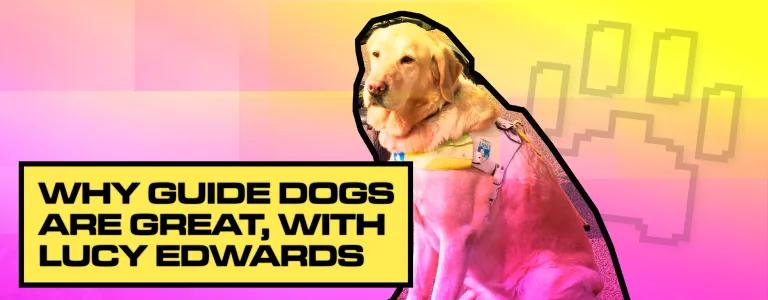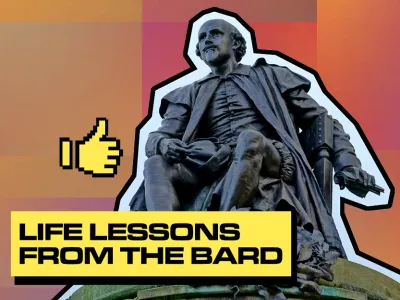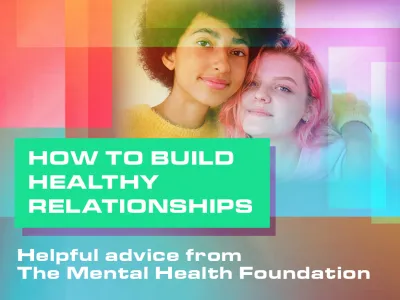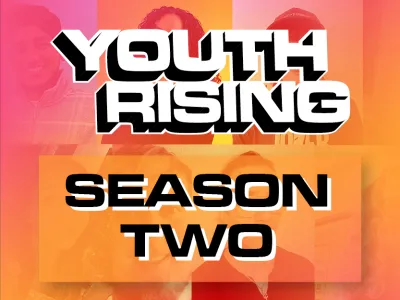
Why Guide Dogs Are Great, With Lucy Edwards
Dogs have been everyone’s best friend since the beginning of time, because, duh, they’re the best. Not only are they happy, fluffy, cuddly and loyal…they’re also dedicated and will do anything for their human pals.
Guide dogs in particular are something to be celebrated. And it’s why there’s an International Guide Dog Day every year! The day honours the work that these furry friends provide for people around the world, from helping them get to places safely, to being a source of emotional support.
Recently, Lottie from our Youth Rising team chatted with Lucy Edwards - a blind broadcaster, content creator, Pantene Ambassador and disability activist - about how she lost her sight and the positive impact her guide dog has had on her life. Check out some of the convo below, and head to wherever you get your podcasts to listen to the whole episode!
Can you give kind of an overview of your blindness, and how early you went blind for people who don't know?
Basically, I have a really rare genetic condition called Incontinentia pigmenti, which runs down the female line of my genes. However, my mum and my late grandma aren't blind, but we all have IP on one of our X chromosomes - getting techie and scientifical! And that just means for me personally, that I lost the eyesight in my right eye at age 11, and the eyesight in my left eye at age 17. So I was really, really young.
What was your initial reaction to that?
Honestly, it's one of the things that kind of gives me shivers still, remembering that time, because the last thing I ever saw was the eye hospital ward at Moorfields Eye Hospital. I remember my mum and my auntie were with me. And my auntie turned to me and said, “look, this is not going to be the end of Lucy Edwards”. But I did feel like at that moment it was, it was the end of time. I felt so scared. I felt so worried about being a teenager, doing my A Levels. I had to do three years at A Levels, not two, because I went blind in the middle of the two years. And then all my friends went off to university without me. So, I did feel scared about my future and because no one knows loads about sight loss and we're not taught, in our school, about disability or anything like that. I was really scared about what kind of goals I would have now and who I would become and how to learn to pour a drink again.
How was that learning process? Did you find it quite frustrating and what things shocked you the most that you had to re-learn again?
Oh, it was so frustrating. So, so frustrating. I remember feeling so stripped of my independence and just feeling like walking out the front door was just not something I could do independently anymore.
I think one anecdote really is when I was pouring a cup of tea, I used something called a Liquid Level Indicator, which is basically a tiny little device that I got from the Royal National Institute for the Blind and you hook it over the side of your mug. It beeps when you get your hot liquid up to the level and it beeps more rapidly when you put in the milk. But obviously pouring the water in the first place, getting the kettle to the spout, I was like “Oh, what do I do?”
I was really lucky that I had a mobility officer named Terry and she taught me how to use my cane and things. But I think at the start, I was a bit like ‘I'm too cool for this,I don't want to be different. I don't want to use my white cane. Like what even is that? I don't want a dog. I don't need it.’
I was bumping into everything! And then I remember this one moment where my best friend Connie got me through and I remember getting my white cane out and she just turned to me and she said, “Lucy, you have to do this now, we can do it together”. So I walked up the corridor, but I hid it for so long, that to be honest, no one really knew in my school that I did have any sort of visual impairment, which is awful to find out. But then I started to become confident again, when I got my guide dog. And that was amazing.
Your guide dog is called Molly. Could you explain a little bit about how she supports you?
Yes, Miss Molly Moo is a little character! She's my second guide dog - I have to always have an honourable mention to my gorgeous Olga, aka Boxy, Bolger. Olga really got me out of my depression and low mood from kind of navigating my life again with sight loss. And then Molly Moo.
Now I have even less vision. I don't really have any light perception anymore, and that is as of about three years ago. So Molly Moo is kind of working with a new me, in that she has to anticipate everything for me. Whereas Olga, I saw a few blurry blobs coming up my face so I could anticipate a little bit more for her. So your guide dog is really a mobility aid for the person.
And we learn from each other as we go, me and Molly.
How she helps me every day is things like when we go round our local routes. She stands at curbs and I count the curbs to my destinations. She finds objects like postboxes, lifts, doors, stairs, all for me.
And that's how I navigate around by finding those objects, like crossings, and we stand at them and she lets me know that she's there and I give her a kibble at them. So she's just amazing. The process of getting a guide dog is five weeks of training - rigorous training - and then you have a little test at the end, and Molly and I passed.
I’ve seen a lot of stuff online about the general public, sometimes unintentionally, distracting a guide dog, thinking they can go in and stroke it like a normal dog you'd pat.
Has this ever happened to you? And how would you want people to interact with you and your dog in public?
Love that question. I think ultimately it's just not to stroke her, because if you distract Molly from her route, she's obviously going to find that object that I talked about, you know, they go from curb to curb to curb. So if they're not looking at the next curb and she gets distracted on the route, if she stops, I'm like, oh, we've obviously stopped at the curb early, but actually it could be someone distracting her and I've probably counted that curb wrong then to get to the next curb. And then I'm like, ‘oh, where actually are we?’ So if you distract a working dog, our route planning is out the window. And then that becomes really scary as the blind person, because I can't then navigate to my full potential. It's just really important not to distract a working dog because they've got a job and she has loads and loads of playtime, loads of off-harness play. She lives with another doggy, my Olga, and she has so many treats, so there's no need to stroke them when they're on harness!




